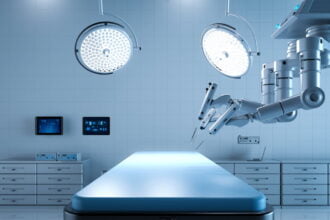We have talked a lot about the ways that technology is changing the healthcare system. Healthcare providers spent over $663 billion on technology last year.
- Environmental and Sustainability Considerations in Modern Laboratory Practices
- Streamlining Laboratory Operations: The Need for Speed and Precision
- The Role of Automation in Reducing Human Error and Enhancing Workflow
- Improving Patient Outcomes Through Enhanced Diagnostic Capabilities
- Ensuring Compliance and Standardisation in Laboratory Testing
One of the biggest ways that hospitals are using technology is to diagnose illnesses more easily. In modern healthcare, hospital laboratories serve as the backbone of medical diagnostics and patient care. The ability to deliver accurate and timely test results is not just a matter of convenience but a critical factor that can influence treatment decisions and, ultimately, patient outcomes. As the demand for healthcare services continues to grow, so too does the pressure on laboratories to operate with greater efficiency, precision, and speed.
Traditionally, hospital laboratories have relied on manual processes and older technologies that, while reliable, often struggle to meet the increasing demands placed on them. The complexity of tests, the volume of samples, and the need for rapid turnaround times have all highlighted the limitations of outdated methods. This has driven a significant shift towards the adoption of modern analytical instruments, which promise to revolutionize the way laboratory operations are conducted.
These advancements are not just about speeding up processes; they are about enhancing the quality and accuracy of the results that are so vital to patient care. From reducing human error through automation to improving environmental sustainability, modern analytical instruments are setting new standards in laboratory efficiency. Moreover, these technologies are empowering healthcare providers to deliver more personalised and effective treatments, underpinned by reliable diagnostic data.
Deloitte has a great article on how technology is changing hospital labs:
“What might hospital care look like globally 10 years from now? The following
scenario offers a preview: Remy is visiting his hometown to accompany his father, John, to the hospital. A
heart patient, John is being admitted for a 3-D printed mitral valve replacement at Metropolis Hospital. Remy is surprised: the facility looks nothing like it did when Remy had his appendix removed in his youth. A digital console nicknamed Welcome Packet is waiting for John at the entrance. It directs him to his room, and helps orient him to the hospital and his schedule. (John’s admission was automatically processed prior to his arrival.) Remy notices the hospital’s smart ergonomic layout, bright lighting, and noise-free rooms. With AI built into his securely stored, cloud-based health records, John can access information on anything related to his care—such as the risks and benefits of the 3-D printedenabled surgery—by using the monitor in his room or his own smartphone.”
In the following sections, we will explore how these cutting-edge instruments are reshaping hospital laboratories, improving workflow, ensuring compliance, and ultimately contributing to better patient outcomes. This shift towards modernisation is not just an upgrade—it’s a necessary evolution that will define the future of healthcare.
Environmental and Sustainability Considerations in Modern Laboratory Practices
As healthcare providers strive for efficiency, they must also consider the environmental impact of their operations. Modern laboratory instruments are not just about speed and precision; they are also designed with sustainability in mind. For example, newer systems often consume less energy, produce less waste, and have a longer operational life compared to their predecessors.
These advancements contribute to a reduced carbon footprint, which is increasingly important as hospitals and healthcare facilities aim to meet sustainability goals. By adopting instruments that are both efficient and environmentally friendly, laboratories can align themselves with broader organisational objectives that prioritise ecological responsibility alongside patient care.
Streamlining Laboratory Operations: The Need for Speed and Precision
Efficiency in hospital laboratories is not solely about processing more samples in less time; it’s about doing so with the highest degree of accuracy. Modern analytical instruments play a crucial role in this regard, offering unparalleled precision and speed in testing processes. For instance, advancements in spectrometry and chromatography have drastically reduced the time it takes to perform complex analyses, allowing laboratories to handle a higher volume of work without compromising on quality.
These instruments are designed to integrate seamlessly into existing workflows, reducing the need for manual intervention and thus minimising the potential for human error. The ability to process samples rapidly and accurately is particularly vital in critical care situations where timely results can significantly impact patient outcomes.
The Role of Automation in Reducing Human Error and Enhancing Workflow
Automation is becoming increasingly prevalent in hospital laboratories, and for good reason. Automated systems can handle repetitive tasks that are prone to human error, such as sample preparation, analysis, and data entry. By reducing the reliance on manual processes, these systems enhance workflow efficiency and improve the reliability of test results.
Moreover, automation allows laboratory staff to focus on more complex tasks that require human expertise, thereby increasing overall productivity. In a hospital setting, where time and accuracy are of the essence, the implementation of automated instruments can lead to more efficient use of resources and better patient care.
Improving Patient Outcomes Through Enhanced Diagnostic Capabilities
The ultimate goal of any hospital laboratory is to improve patient outcomes, and modern analytical instruments are at the forefront of achieving this objective. One of the key technologies driving this improvement is ion chromatography. Suitable ion chromatography systems are indispensable in the accurate analysis of a wide range of ions in biological samples, from electrolytes to trace metals. This precision is crucial in diagnosing conditions such as kidney disorders, where electrolyte balance is critical, or in monitoring metal exposure, which can have severe health implications.
Ion chromatography offers a level of accuracy and reliability that is essential for making informed clinical decisions. By providing precise and timely data, these systems enable healthcare providers to tailor treatment plans more effectively, leading to better patient outcomes. Furthermore, the ability of ion chromatography to analyse complex samples with minimal preparation reduces the risk of contamination or error, ensuring that the results are both accurate and reproducible.
Ensuring Compliance and Standardisation in Laboratory Testing
Compliance with regulatory standards is a critical aspect of laboratory operations. Modern analytical instruments are designed to meet stringent regulatory requirements, providing laboratories with the tools they need to maintain compliance. These instruments often come equipped with software that facilitates the standardisation of testing procedures, ensuring that results are consistent and reliable across different tests and even different facilities.
Standardisation is essential not only for regulatory compliance but also for ensuring that patient care is uniform regardless of where the tests are conducted. By using modern instruments that support standardised procedures, hospitals can ensure that every patient receives the same level of care, no matter where they are treated.
The Future of Hospital Laboratories: Trends and Innovations to Watch
As technology continues to advance, the future of hospital laboratories looks promising. One emerging trend is the increasing integration of artificial intelligence (AI) with analytical instruments. AI has the potential to further enhance the efficiency and accuracy of laboratory operations by identifying patterns and anomalies that may not be immediately apparent to human operators.
Another area to watch is the development of portable and point-of-care diagnostic tools. These instruments, which can perform complex analyses outside of traditional laboratory settings, are set to revolutionise patient care by providing immediate results in clinical environments. This trend towards decentralised testing could lead to faster diagnosis and treatment, particularly in emergency situations.
Additionally, advancements in materials science and nanotechnology are likely to result in the development of even more precise and efficient analytical instruments. These innovations will not only improve the accuracy of diagnostic testing but also reduce the environmental impact of laboratory operations by creating instruments that are smaller, more energy-efficient, and produce less waste.







